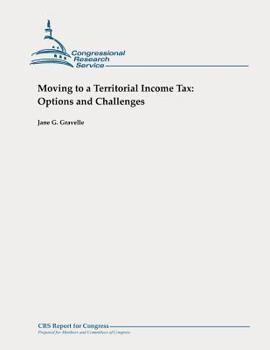Moving to a Territorial Income Tax: Options and Challenges
Among potential tax reforms under discussion by Congress is revising the tax treatment of foreign source income of U.S. multinational corporations. Some business leaders have been urging a movement toward a territorial tax, which would eliminate some U.S. income taxes on active foreign source income. Under a territorial tax, only the country where the income is earned imposes a tax. Territorial proposals include the Grubert-Mutti proposal (included in President Bush's Advisory Panel on Tax Reform proposal in 2005) and, more recently, a draft Ways and Means Committee proposal and a Senate bill, S. 2091. The Fiscal Commission also proposed a territorial tax. Proposals have, however, also been made to increase the taxation of foreign source income, including S. 727, and proposals by President Obama. Although the United States has a worldwide system that includes foreign earnings in U.S. taxable income, two provisions cause the current system to resemble a territorial tax in that very little tax is collected. Deferral delays paying taxes until income is repatriated (paid as a dividend by the foreign subsidiary to its U.S. parent). When income is repatriated, credits for foreign taxes paid offset the U.S. tax due. Under cross-crediting, unused foreign tax credits from high tax countries or on highly taxed income can be used to offset U.S. tax on income in low tax countries. Some proponents of a territorial tax urge such a system on the grounds that the current system discourages repatriations. Economic evidence suggests that effect is small, in part because in normal circumstances a large share of income is retained for permanent reinvestment. Amounts held abroad may have increased, however, as firms lobbied for another repatriation holiday (similar to that adopted in 2004) that allowed firms to exempt most dividends from income on a one-time basis. Opponents are concerned about encouraging investment abroad. A territorial tax is generally not viewed as efficient because it favors foreign investment, but that increased outflow of investment is likely to have a small effect relative to the U.S. economy. Artificial shifting of profits into tax havens or low tax countries is a current problem that could be worsened under some territorial tax designs, and proposals have included measures to address this problem. Proposals also address the transitional issue of the treatment of the existing stock of unrepatriated earnings. The Ways and Means proposal would tax this stock of earnings, but at a lower rate, and use the revenues to offset losses from other parts of the plan, which would lead to a long-run revenue loss. S. 2091 has a similar approach. The Grubert-Mutti proposal does not have a specific transitional tax, but would raise revenue largely due to its disallowance of parent overhead expenses aimed at reducing profit shifting. The other two proposals also contain provisions to address profit shifting. In addition there are complicated issues in the design of a territorial tax, such as how to treat branches and dividends of firms in which the corporation is only partially owned. A number of issues arise from the ending of foreign tax credits, with perhaps the most significant one being the increased tax on royalties, which are currently subject to tax, have low or no foreign taxes, and would lose the shield of excess credits. The final section of the report briefly discusses some alternative options, including those in S.727 and in the Administration proposals. It also discusses hybrid approaches that combine territorial and worldwide systems in a more efficient way, including eliminating the disincentive to repatriate. One such approach is a minimum tax on foreign source income, which is proposed by the President in the context of current rules, but could be combined with a territorial system.
Format:Paperback
Language:English
ISBN:147835559X
ISBN13:9781478355595
Release Date:August 2012
Publisher:Createspace Independent Publishing Platform
Length:50 Pages
Weight:0.31 lbs.
Dimensions:0.1" x 8.5" x 11.0"
Customer Reviews
0 rating





